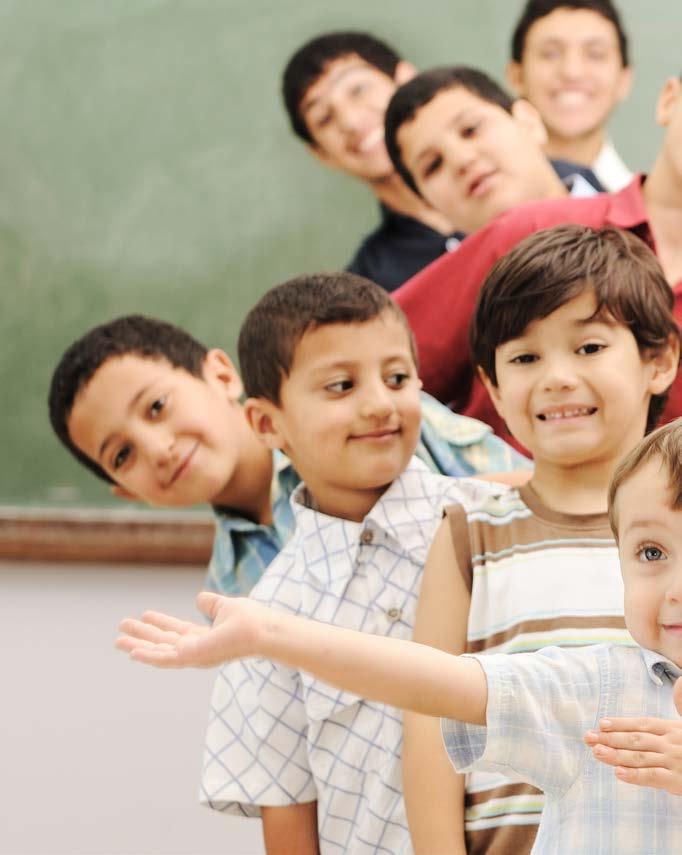
13 minute read
EDUCATION
This month is all about helping your child to perform at school, and school helping your child to perform in life! HELPING YOUR CHILD’S SCHOOL PERFORMANCE
With the advent of the new school term, here are some ways you can help to maximise the potential of your kids.
NUTRITIOUS BREAKFAST A nutritious breakfast fuels the brain and sets children up ready to focus and learn. Studies show that children who eat breakfast have more energy and do better in school than those who skip this important meal. You can help boost your child's attention span, concentration and memory by providing breakfast foods that are rich in whole grains, fibre and protein, as well as low in added sugar. If your child is running late some mornings, send along fresh fruit, nuts, yogurt, or half a peanut butter and banana sandwich.
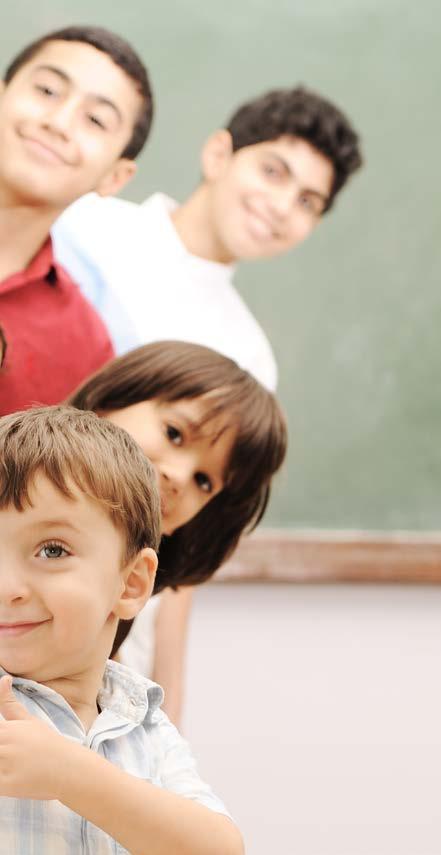
THE RIGHT AMOUNT OF SLEEP Childen also need the right amount of sleep to be alert and ready to learn all day. Most school-age kids need 10 to 12 hours of sleep a night. Bedtime difficulties can arise for a variety of reasons, including homework commitments, sports, afterschool activities, TVs, computers, video games, as well as hectic family schedules, can all contribute to kids not getting enough sleep. Lack of sleep can cause irritable or hyperactive behavior and might make it hard for kids to focus in classes. It's therefore important to have a consistent bedtime routine, especially on school nights. Be sure to leave enough time before bed to allow your child to unwind before bed and limit stimulating diversions like TV, video games and Internet access.
ORGANISATIONAL SKILLS No one is born with great organisational skills - they need to be taught and then practiced! When kids are well organised, they can stay focused instead of getting distracted looking for their things at the last minute. For schoolwork, being organised means having an assignment book and homework folder to keep track of homework and projects. Check your child's assignment book and homework folder every school night so you're familiar with assignments and your child doesn't fall behind. Set up a place for papers that you need to check or sign. Encourage your child to keep his or her work desk orderly so papers that need to come home don't get lost. Teach your child how to use a calendar or personal planner to help stay organised. It's also invaluable to teach your child how to make a to-do list to help prioritise and get things done.
SCHOOL ATTENDANCE Sometimes students want to stay home from school because of problems with classmates, assignments or grades, or even teachers. This can result in real symptoms, like headaches or stomach aches. If you think there's a problem at school, talk with your child and then with the teacher if necessary to find out more about what's causing the anxiety. The school counsellor or school psychologist might also be able to help. Otherwise, it's important that kids arrive at school on time every day, because having to catch up with classwork and homework can be stressful and interfere with learning. If your child is missing a lot of school due to illness, make sure to check with the teacher about any work that needs to be completed. It's also a good idea to know the school's attendance policy.
GET TO KNOW THE TEACHERS & ATTEND PARENT-TEACHER MEETINGS Children do better in school when parents are involved in their academic lives, so get to know your child's teachers and what they expect from your child. School administrators are also useful contacts for helping you to understand extra-curricular school programmes and policies. Attending parent-teacher conferences is another way to stay informed. These meetings are a chance to discuss ways to help your child do his or her best in class. Meeting with the teacher also lets your child know that what goes on in school will be shared at home.
ENCOURAGE OPEN COMMUNICATION ABOUT SCHOOL It's usually easy to talk with younger children about what's going on in class and the latest news at school. You probably know what books your child is reading and are familiar with the topics being worked on. But parents can get busy and forget to ask the simple questions, which can sometimes have an effect on a child's success at school. Make time to talk with your child every day, so he or she knows that what goes on at school is important to you. When kids know parents are interested in their academic lives, they'll take school seriously as well. Because communication is a two-way street, the way you talk and listen to your child can influence how well your child listens and responds. It's important to listen carefully, make eye contact and focus only on them while you talk. Be sure to ask questions that go beyond ‘yes’ or ‘no’ answers. Aside from family meals, good times to talk include car trips and going for regular walks together. Encouraging constant, positive communication about what is happening in your child's school will set the stage for children to develop and grow as older students who can turn to you with any issues they are having.
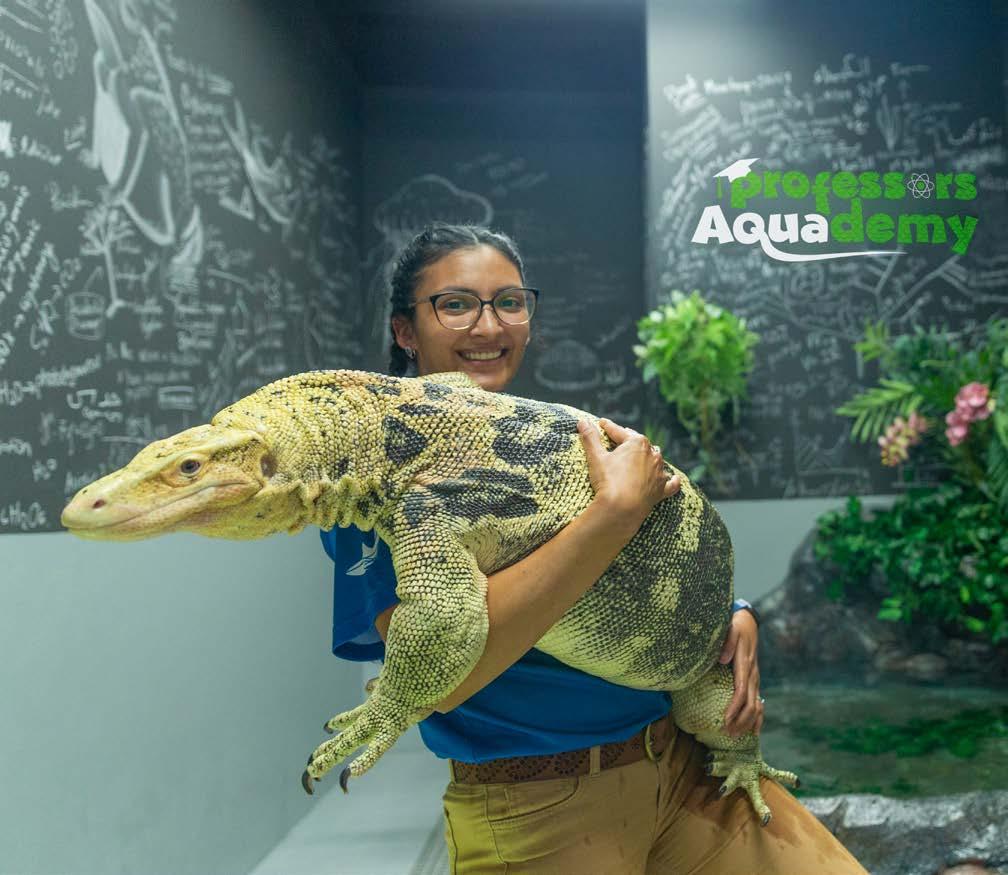
NOMINATE YOUR FAVOURITE TEACHER TO HOST A REMOTE CLASS FROM THE NATIONAL AQUARIUM
The largest aquarium in the Middle East, The National Aquarium at Al Qana in Abu Dhabi, has launched a first-of-its-kind programme to inspire school children at the aquarium.
The curriculum will cover four key topics, from the UAE’s coastal heritage to conservation. These are designed to share knowledge and spark interest amongst the younger generations about the natural world. Until the time school excursions recommence, The National Aquarium will be offering free online sessions to the education community…with a twist. In response to the new challenges presented by Covid-19, The National Aquarium has launched ‘Professor’s Aquademy’ virtually to schools. Students are able to nominate one teacher from their school to visit the aquarium and livestream the experience with the students. The nominated teacher will need to ‘face their fears’ and enter the habitats for a hands-on teaching experience with ‘Professor’ the Water Monitor Lizard, rehabilitated Sea Turtles and other iconic animals from all around the world. During the interactive video session, the education team will introduce informative and fun topics to provide a flavour of the aquarium’s innovative school tours to the students. ‘Professor’ the Water Monitor Lizard, was hand-reared and trained by a certified breeding facility in Los Angeles that meets all the international standards. The ‘Professor’ started his career in Hollywood pictured with numerous celebrities but now in Abu Dhabi, his role as education ambassador will help many UAE students to access and learn about the wonders of the natural world at the aquarium. The Water Monitor is a good ambassador for this programme because as a species, it plays a key role in forests, rivers and coastlines, moving across multiple habitats, which are all represented within The National Aquarium’s ten zones. Education is a priority for The National Aquarium to enlighten all generations on the natural world around them, and the concept of conservation. Inspired by Baba Dioum, a celebrated Senegalese environmentalist, this programme is designed to open school children’s minds through knowledge and understanding. Baba Dioum’s quote motivates the education team every day, “In the end, we will conserve only what we love; we will love only what we understand, and we will understand only what we are taught.” Aspen Heights British School, a part of International Schools Partnership – a global group of international schools, was the first school to visit ‘Professor,’ creating a much excitement and anticipation for the educational programme. A professional marine biologist and trained educators from The National Aquarium answered the many questions the students had about ‘Professor’ during the online class. The education team explained the importance of preserving the marine environment and how to protect the animals. Since environmental awareness is an important part of the daily lives of students at Aspen Heights British School, this visit was included as part of their biology classes. Emma Shanahan, Principal for Aspen Heights British School said: “We’re excited to be the first school to meet ‘Professor’ and work with The National Aquarium education team. This meeting fits well with our focus on providing hands-on learning opportunities for our students at Aspen Heights British School. Our children are passionate about the natural world, and an important part of our curriculum focuses on the ocean, how our students interact with their natural environment and sustainability. Through this unique online lesson our students were able to develop an awareness and support them in being more conscious about the world around them. Meeting ‘Professor’ has brought learning to life for them, answered a lot of their questions, all while giving them even more to think about.” Anne Bourbon, Manager of Education & Conservation at The National Aquarium adds: “The introduction of our education programme and ‘Professor’ is an important component of the aquarium’s ethos – becoming a regional role model in both conservation and education. At The National Aquarium, we always look for fun, interactive and responsible ways to educate our community and visitors. What we are offering is an approach to learn by getting closer to animals and their environments, with the desire of inspiring young minds to reconnect with nature and think of solutions to achieving a sustainable future. We are convinced that playful learning (edutainment) can have a positive and appealing impact on a child’s education. “Monitor Lizards are fascinating animals and ‘Professor’ is an excellent choice as our ambassador since he grew up in close contact with people, particularly children. Moreover, he also represents the connection between land and aquatic environments. He will be the star of our school programs and we are thrilled to introduce him to the students in the UAE for a memorable experience.” Schools and teachers in Abu Dhabi can request a free online educational session to meet ‘Professor’ and set up a video conference call. Ultimately, these educational programmes will be held in person at The National Aquarium when restrictions lift. For requests, contact The National Aquarium education department at: education@ thenationalaquarium.ae
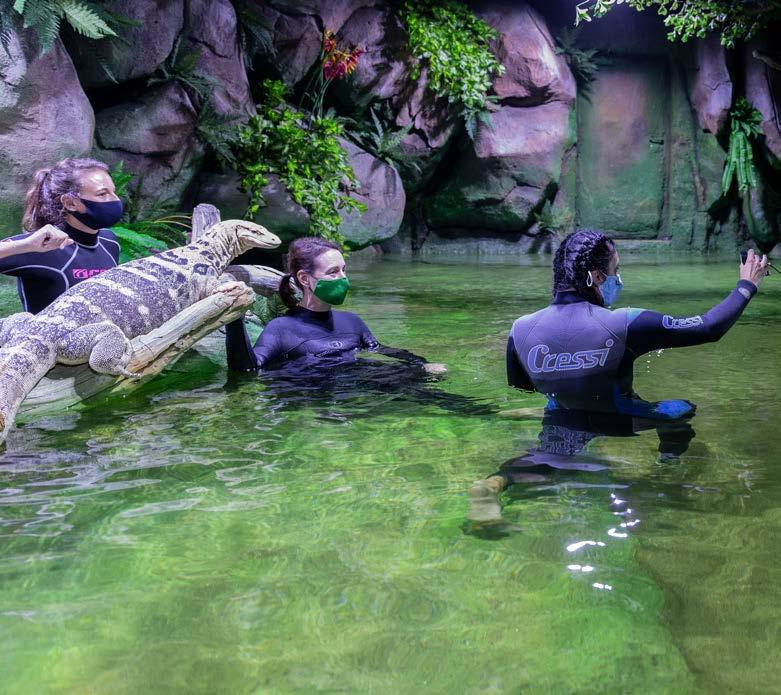
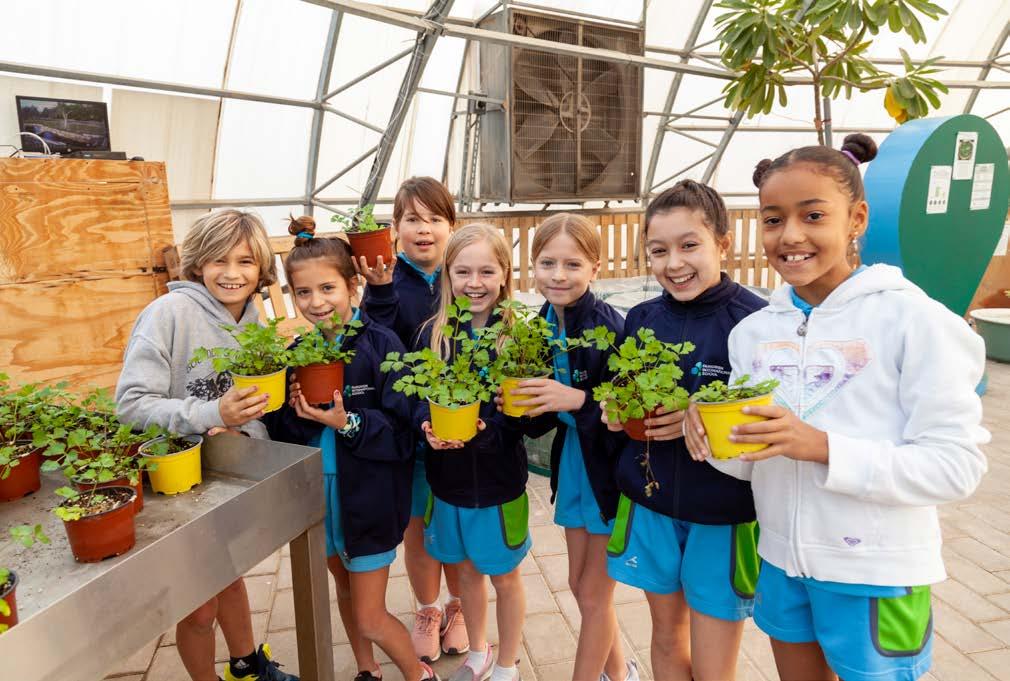
THE NURTURING EFFECTS OF A NATUREBASED EDUCATION
This fascinating article explores why more and more educators are providing schools where nature is at the core of the curriculum, especially during the early years.
From peacefulness to utter exuberance, surely you remember the range of emotions you experienced as a child playing outside, no matter the season. The astounding psychological and developmental responses children experience with time spent under the sun, walking through a freshly cut lawn, climbing a tree, chasing butterflies, or digging in a garden, is why more and more educators seek to provide schools where nature is at the core of the curriculum, especially during the early years. While evidence in countless journals suggests that access to nature and green space provides children with myriad of cognitive, emotional and physical benefits; such as increased ability to concentrate, improved academic performance, reduced stress and aggression levels, and reduced risk of obesity; children are still spending less time outdoors than ever before. Beyond the psychological and physical benefits of nature-based early years programmes, many educators, environmentalists, scholars and parents are becoming increasingly aware of how an early connection with nature will help foster a natural desire in children to care about sustainability - they grow up with a propensity toward protecting and caring for the environment. Located in The Sustainable City, Fairgreen International School was one of the first schools in Dubai to open with a mission to
embrace and promote sustainability in all its forms among its students, starting from early childhood. Here, we speak to Fairgreen’s Early Years Coordinator Cheryl Wood about how the school is fulfilling its mission to connect students to the natural world.
How do children benefit from learning outdoors?
Children at a young age need to have time to connect with nature and to begin to understand the world around them. Human beings are naturally curious from birth, and allowing children time outdoors broadens their scope of curiosity, as well as helping them to develop both their gross motor control and their physical growth. Studies have shown how increased time outdoors can help to support children's eye development, for example. Learning simply should not be restricted by four walls. It must span to the outside world.
How does Fairgreen's Early Childhood programme incorporate learning from nature?
In a typical school year, our location in The Sustainable City allows us to connect with nature through the abundance of activities and natural environments prevalent outside our back door, such as feeding the farm animals in the animal sanctuary and duck pond, observing how to care for them and what they need to grow. This links with our IB Units of Inquiry such as ‘Sharing The Planet’ and ‘How the World Works.’ Children enjoy learning about how to grow and care for plants in our biodome and garden plot. It helps children with their early phonics skills to go on listening walks around the community and hear the wide range of different sounds such as the donkeys braying, ducks quacking, birds tweeting and water trickling from the fountains. These are sounds that many children do not get to experience within Dubai on a daily basis. Due to Covid-related restrictions, students haven’t been able to get out into The Sustainable City as much this academic year, given that schools are not allowed any off-campus activities. To compensate, students have been growing and tending their own gardens on the terraces outside their classrooms. Our secondary students recently designed and planted a new rooftop garden and our Early Years students will soon begin tending to a portion of this garden as well. We also have tower gardens where students are growing herbs and small plants. In addition to time spent playing in our ergonomically designed, multi-sensory playground, early years students ride our three-wheel bicycles around campus nearly every day, helping them develop gross motor control while also allowing them to reap in the fresh air and sunshine.

A big emphasis at Fairgreen is on helping students develop a passion for sustainability. How are teachers doing this at these early stages of student development?
Sustainability is something that we talk with the children about continually. We recycle within the classroom. We encourage children to bring in reusable items from home to use in their craft projects, choosing reusable materials over glitter and sequins. We have created classroom environments that are sustainable and link to nature. We avoid bright coloured decor and instead use natural colours and resources, as these help to develop children's concentration levels and the materials are sustainable. We plan in Units of Inquiry that link to how to use our tower gardens and we teach children how we can grow food sustainably. We explain conservation of water and electricity to the children. We select students to be ‘light monitors’ who tell us when we can turn the lights off and make sure that we switch them off when we are leaving a classroom.
Why do you feel it's important for young children to learn about the concepts of sustainability from an early stage?
Children are the future of the planet. We need them to have a solid understanding of the importance of sustainability so that they will grow into adults who will change the world. Join Fairgreen International School’s “Early Years Discovery” Virtual Open Day on Wednesday 13th January, at 11am via Zoom. You’ll meet Fairgreen’s Director, the Early Years Coordinator and learn more about their Early Years programme, IB curriculum, emphasis on sustainability, and culture of care and wellbeing. Visit fairgreen.ae/virtual to register!






